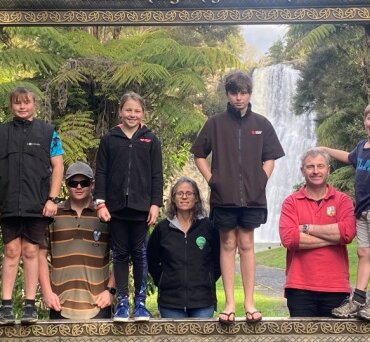
The Kinston family: Jennie Macky, James Kinston, Bevan, 16, George 14, Nicole 12, Amelia 10 and Declan 7.
“This is the cool thing about animals, they love you unconditionally and they’re always there but right now humans require them more.”
“Animals are cool.”
A Waipā dairy farmer has compared the Covid 19 Delta strain outbreak to foot and mouth disease saying both ruin economies if not managed properly.
Jennie Macky, 46, who is also a dairy cattle veterinarian, farms at Parawera with husband James Kinston and their five children. They own Teaser Bull, a business which uses teaser bulls to detect cows on heat.
The couple met in the United Kingdom 20 years ago where Jennie was working as a locum vet in Cumbria during an outbreak of foot and mouth disease.
“I slaughtered cows for three months. It was awful. It’s a life experience I will never forget.”

Jennie Macky with Fred, her 1-year-old labradoodle.
She compared its impact to Covid 19 today.
“When you’re living in it, and you are doing it day to day, you just need good strong people to make good, structured decisions to get the job done.
“I was literally walking in and killing perfectly healthy stock. The farmers were accepting so long as someone explained it to them and was upfront and honest with them.
“You couldn’t afford to let it run rampant, so you have to do what you have to do.”
Both Delta and foot and mouth are airborne viruses.
“Foot and mouth to a farmer in New Zealand is unthinkable.”
So, what is life like in lockdown for the Kinston family?
Because it is spring, a traditionally busy time on any New Zealand farm, there was nothing about the lockdown which was having an impact on them other than the children were all home and able to help on the farm.
“For farmers, this is what we train every year for. Right now, sheep farmers are in lambing and we’re in calving,” says Macky.
“This is when the pay cheques start rolling in, the grass is starting to grow.”
Milk is going out and feed is coming in, she said.

The Kinston family: Jennie Macky, James Kinston, Bevan, 16, George 14, Nicole 12, Amelia 10 and Declan 7.
“It’s quite normal for us to be locked in at home, only working and living with our family, not going to town and not seeing people
“When people question mental health in the rural industry and why is it so high, this is why.”
Given the mental stress lockdowns have had on urban people, it’s timely to point out that way of life is something rural people face regularly.
Macky was brought up on a sheep and beef farm near Tirau and once qualified worked in practice mostly doing small animal work.
When the relationship between the couple started in the UK, she was quite blunt.
“I said to him: ‘I’m never going to live in the UK so if this relationship is going anywhere, you have to pack your bags and leave’.”
Kinston, who was brought up on a dairy farm near Burton-on-Trent, had studied agricultural engineering a profession which makes him invaluable on the couple’s Parawera farm.
“Anything agricultural, he can fix. He can weld, he can design, anything engineering, he’s onto it.”
Macky uses her veterinarian skills on the animals and has no sympathy for anti vaxxers.
“Getting people vaccinated as quick as they can be is important.
“There’s loads of diseases out there in the animal industry if you’re not vaccinating, it’s not worth seeing.”
The irony is not lost on her that the UK struggles to recognise the importance of vaccinations in agriculture but is ahead of New Zealand when it comes to humans.
“We know that in England, their human medicine is well above what we’ve got.”
The role of animals during Covid lockdowns around the world has been celebrated. Macky said that is no surprise to her.
“This is the cool thing about animals, they love you unconditionally and they’re always there but right now humans require them more. That contact. Animals are cool.”
And what about the whole family being home?
“We have said more than once, isn’t it grand to have such a big family? They just get on so well. It’s brilliant having heaps of kids.
“We’re all working really hard; James and I are working two farms and it doesn’t hurt the kids to see this part of life.
“There’s not a lot of schoolwork going on though.”
Life on a Parawera farm, just another normal day in lockdown.

The Kinston family: Jennie Macky, James Kinston, Bevan, 16, George 14, Nicole 12, Amelia 10 and Declan 7.








